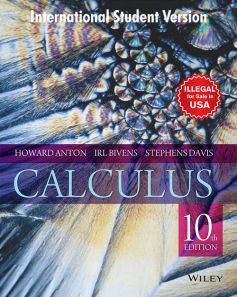Calculus, 10ed, ISV
ISBN: 9788126556403
1320 pages
Publication Year: 2015
For more information write to us at: acadmktg@wiley.com

Description
The new edition of Calculus continues to bring together the best of both new and traditional curricula in an effort to meet the needs of even more instructors teaching calculus. The author team's extensive experience teaching from both traditional and innovative books and their expertise in developing innovative problems put them in an unique position to make this new curriculum meaningful for those going into mathematics and those going into the sciences and engineering. This new text exhibits the same strengths from earlier editions including an emphasis on modeling and a flexible approach to technology.
Before Calculus
0.1 Functions
0.2 New Functions from Old
0.3 Families of Functions
0.4 Inverse Functions
Limits and Continuity
1.1 Limits (An Intuitive Approach)
1.2 Computing Limits 62
1.3 Limits at Infinity; End Behavior of a Function
1.4 Limits (Discussed More Rigorously)
1.5 Continuity
1.6 Continuity of Trigonometric Functions
The Derivative
2.1 Tangent Lines and Rates of Change
2.2 The Derivative Function
2.3 Introduction to Techniques of Differentiation
2.4 The Product and Quotient Rules
2.5 Derivatives of Trigonometric Functions
2.6 The Chain Rule
2.7 Implicit Differentiation
2.8 Related Rates
2.9 Local Linear Approximation; Differentials
The Derivative in Graphing and Applications
3.1 Analysis of Functions I: Increase, Decrease and Concavity
3.2 Analysis of Functions II: Relative Extrema; Graphing Polynomials
3.3 Analysis of Functions III: Rational Functions, Cusps and Vertical Tangents
3.4 Absolute Maxima and Minima
3.5 Applied Maximum and Minimum Problems
3.6 Rectilinear Motion
3.7 Newton's Method
3.8 Rolle's Theorem; Mean-Value Theorem
Integration
4.1 An Overview of the Area Problem
4.2 The Indefinite Integral
4.3 Integration by Substitution
4.4 The Definition of Area as a Limit; Sigma Notation
4.5 The Definite Integral
4.6 The Fundamental Theorem of Calculus
4.7 Rectilinear Motion Revisited Using Integration
4.8 Average Value of a Function and its Applications
4.9 Evaluating Definite Integrals by Substitution
Applications of The Definite Integral in Geometry, Science and Engineering
5.1 Area Between Two Curves
5.2 Volumes by Slicing; Disks and Washers
5.3 Volumes by Cylindrical Shells
5.4 Length of a Plane Curve
5.5 Area of a Surface of Revolution
5.6 Work
5.7 Moments, Centers of Gravity and Centroids
5.8 Fluid Pressure and Force
Exponential, Logarithmic and Inverse Trigonometric Functions
6.1 Exponential and Logarithmic Functions
6.2 Derivatives and Integrals Involving Logarithmic Functions
6.3 Derivatives of Inverse Functions; Derivatives and Integrals Involving Exponential Functions
6.4 Graphs and Applications Involving Logarithmic and Exponential Functions
6.5 L'Hôpital's Rule; Indeterminate Forms
6.6 Logarithmic and Other Functions Defined by Integrals
6.7 Derivatives and Integrals Involving Inverse Trigonometric Functions
6.8 Hyperbolic Functions and Hanging Cables
Principles of Integral Evaluation
7.1 An Overview of Integration Methods
7.2 Integration by Parts
7.3 Integrating Trigonometric Functions
7.4 Trigonometric Substitutions
7.5 Integrating Rational Functions by Partial Fractions
7.6 Using Computer Algebra Systems and Tables of Integrals
7.7 Numerical Integration; Simpson's Rule
7.8 Improper Integrals
Mathematical Modeling with Differential Equations
8.1 Modeling with Differential Equations
8.2 Separation of Variables
8.3 Slope Fields; Euler's Method
8.4 First-Order Differential Equations and Applications
Infinite Series
9.1 Sequences
9.2 Monotone Sequences
9.3 Infinite Series
9.4 Convergence Tests
9.5 The Comparison, Ratio and Root Tests
9.6 Alternating Series; Absolute and Conditional Convergence
9.7 Maclaurin and Taylor Polynomials
9.8 Maclaurin and Taylor Series; Power Series
9.9 Convergence of Taylor Series
9.10 Differentiating and Integrating Power Series; Modeling with Taylor Series
Parametric and Polar Curves; Conic Sections
10.1 Parametric Equations; Tangent Lines and Arc Length for Parametric Curves
10.2 Polar Coordinates
10.3 Tangent Lines, Arc Length and Area for Polar Curves
10.4 Conic Sections
10.5 Rotation of Axes; Second-Degree Equations
10.6 Conic Sections in Polar Coordinates
Three-Dimensional Space; Vectors
11.1 Rectangular Coordinates in 3-Space; Spheres; Cylindrical Surfaces
11.2 Vectors
11.3 Dot Product; Projections
11.4 Cross Product
11.5 Parametric Equations of Lines
11.6 Planes in 3-Space
11.7 Quadric Surfaces
11.8 Cylindrical and Spherical Coordinates
Vector-Valued Functions
12.1 Introduction to Vector-Valued Functions
12.2 Calculus of Vector-Valued Functions
12.3 Change of Parameter; Arc Length
12.4 Unit Tangent, Normal and Binormal Vectors
12.5 Curvature
12.6 Motion Along a Curve
12.7 Kepler's Laws of Planetary Motion
Partial Derivatives
13.1 Functions of Two or More Variables
13.2 Limits and Continuity
13.3 Partial Derivatives
13.4 Differentiability, Differentials and Local Linearity
13.5 The Chain Rule
13.6 Directional Derivatives and Gradients
13.7 Tangent Planes and Normal Vectors
13.8 Maxima and Minima of Functions of Two Variables
13.9 Lagrange Multipliers
Multiple Integrals
14.1 Double Integrals
14.2 Double Integrals over Nonrectangular Regions
14.3 Double Integrals in Polar Coordinates
14.4 Surface Area; Parametric Surfaces
14.5 Triple Integrals
14.6 Triple Integrals in Cylindrical and Spherical Coordinates
14.7 Change of Variables in Multiple Integrals; Jacobians
14.8 Centers of Gravity using Multiple Integrals
Topics In Vector Calculus
15.1 Vector Fields
15.2 Line Integrals
15.3 Independence of Path; Conservative Vector Fields
15.4 Green's Theorem
15.5 Surface Integrals
15.6 Applications of Surface Integrals; Flux
15.7 The Divergence Theorem
15.8 Stokes' Theorem
A Appendices
A Graphing Functions Using Calculators and Computer Algebra Systems
B Trigonometry Review
C Solving Polynomial Equations
D Selected Proofs
Answers To Odd-Numbered Exercises
Index I
Web Appendices (Online Only)
E Real Numbers, Intervals and Inequalities
F Absolute Value
G Coordinate Planes, Lines and Linear Functions
H Distance, Circles and Quadratic Equations
I Early Parametric Equations Option
J Mathematical Models
K The Discriminant
L Second-Order Linear Homogeneous Differential Equations
Web Projects: Expanding The Calculus Horizon (Online Only)
Blammo The Human Cannonball
Comet Collision
Hurricane Modeling
Iteration and Dynamical Systems
Railroad Design
Robotics

